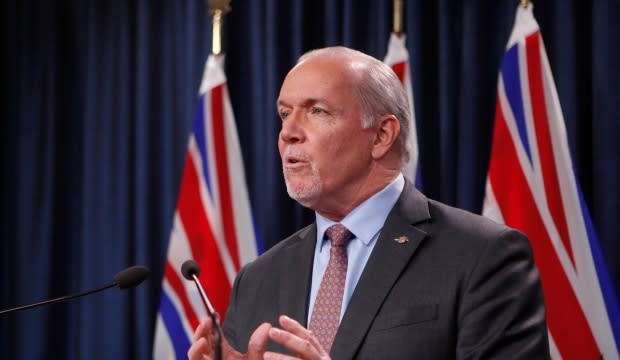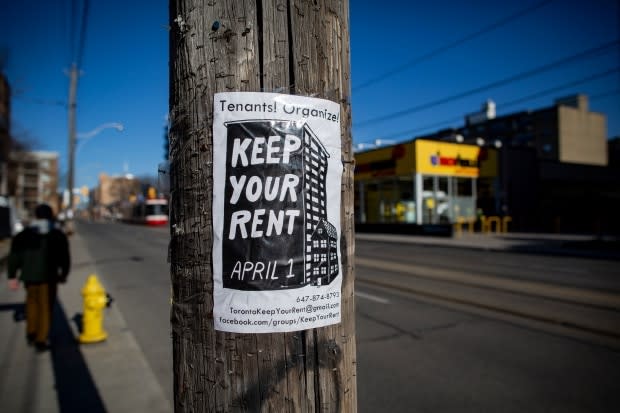'We're all struggling': Tenants — and landlords — anxious as April 1 rent day arrives
It's been more than two weeks since Karla Mounsteven got her last paycheque, and in one day it'll all be gone.
The single mother living in Georgetown, Ont., worked on contract as an administrator at a local dance school, but it closed because of the COVID-19 pandemic, leaving her without a job and an income to support her three-year-old son.
"I have the money in the bank right now to make my April 1st rent. But that's it," said Mounsteven.
"So what about feeding my son and paying my bills? I don't know how long this is going to go on for, and that scares me."
She reached out to her building's landlord but is still waiting to hear back about a possible rent deferral.
April 1 is the first time people are paying rent since COVID-19 became a pandemic, prompting the closure of thousands of businesses and forcing hundreds of thousands out of a job.
While the federal government's emergency benefit will help, and provinces are offering different forms of assistance, some people say the help will come too late for April — and there is anxiety over what will be left once their rent cheques are cashed.
Some landlords — who rely on the income of renters — say they, too, are worried about how they'll make ends meet if rent isn't paid for a prolonged period.
What help is available
The federal government has introduced a number of measures intended to help people like Mounsteven.
The Canada Emergency Response Benefit (CERB) offers income support for up to 16 weeks to those who lose pay because of the pandemic.
The problem, however, is that most can't apply until April 6, and the money won't flow until after that.
British Columbia has introduced a $500 a month rental supplement — to be paid directly to landlords — for those struggling with payments, but there's no guarantee it'll come into effect by Wednesday.
Every province has put a halt to evictions or temporarily suspended eviction hearings, and provincial leaders have called on landlords to be flexible. But for many, rent is still due April 1, bringing uncertainty.

Alice Phillips, a resident of Golden, B.C., was laid off from her job as a server at a ski resort two weeks ago and has applied for employment insurance benefits. She spoke to her landlord and explained her situation, but was told that the rent in full was due on April 1.
"I don't know really … how I'm going to do that," said Phillips.
"I get that it's hard for [my landlord] as well because she still has her bills to pay … but that would be the rest of my money for groceries until EI comes in, and I have no idea when that's going to be. So it's very stressful."
Cancel rent
Posters have started popping up in cities like Toronto calling for renters to keep their rent money come April 1, but that's a source of anxiety for landlords who depend on the income of renters monthly.
Amberley Teeninga and her husband rent out two separate units they own, and they rely on the income from their tenants.
"My husband owns a business, so he's had to close his doors too. So just a little uncertain and kind of nerve-wracking not knowing for sure if you're going to have an income, because that's kind of our consistent income," said Teeninga, a mother of two — with a third on the way — living in Bowmanville, Ont.

Earlier this month, Finance Minister Bill Morneau asked the heads of Canada's big banks to allow people to defer mortgage payments for up to six months, but concerns have been raised about eligibility, interest accrued and the impact on credit scores.
Teeninga said she and her husband are willing to work with her tenants to come to an arrangement if they need help, but campaigns for everyone to stop paying rent ignore the realities landlords face.
"Just be open minded and think about what the landlords are losing as well in this."
Waiting game
Mounsteven said she's hoping to connect with her landlord on April 1 in hopes they can discuss a break on her rent. She has the support of her parents, but they too have been affected by work losses.
"My mom's livelihood is a self-employee business as well, which is closed down. My dad's off work. As much as we want to rely on and help each other, it's hard now. We're all struggling."

Mounsteven said she plans to apply for the federal Canada Emergency Response Benefit, but is uncertain when that money will start flowing.
"Being a single parent is a struggle on its own. And I think being a single parent now in this time — it's hard."

